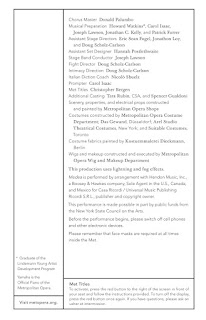Metropolitan Opera at Lincoln Center. Balcony (Seat D110, $87.50).
Story. Jason (Giasone) of Gold Fleece and Argo fame married Medea while in Colchis, they had two sons. After they moved to Corinth, Jason abandoned Medea while taking custody of the children, and was to be married to Glauce, daughter of King Creonte. As the wedding is celebrated, Medea appears with her maid ("confidante" in the Program Notes). She is asked by Creonte to leave, but is successful in pleading for an extra day so she can say farewell to her children, whom are brought to her. She kills the children, and the gifts she gave Glauce (a robe and a diadem) kill Glauce. She ends up going up in flames inside the temple holding the bodies of her two sons.
Conductor - Carlo Rizzi; Glauce - Janai Brugger, Creonte - Michele Pertusi, Giasone - Matthew Polenzani, Medea - Sondra Radvanovsky, Neris - Olivia Vote.
View of stage from my seat in the Balcony. The performance was well-attended.
These two photographs on display at the Dress Circle level (I think) depict scenes from Medea. I took them on 3/28/2023, while I watched Lohengrin.
The story in the opera begins with the preparation for the wedding of Glauce to Jason, and indeed there are many details put in the story (e.g., Medea struggling to decide what to do with her sons). The neighbors seated next to me both agree the story is straightforward.
The synopsis for the opera describe a powerful portrayal of how one devolves from being a victim to one bent on revenge ("this entire palate of emotion," as described in the Program Notes). Medea, however, comes across as mostly a sympathetic figure: a woman abandoned and scorned, and finally decided she couldn't take it anymore, killing her children before killing herself. Radvanovsky's portrayal elicits pity, but not disgust, fear, and dread. Perhaps that was the intention, or because her voice is just not appropriate for such emotions. There is a reason why villains are mostly sung by basses.
She can't quite act the part of a villain either. The only "fear" she elicited was when she first appeared, covered in a net. That quickly went away after she removed the veil. The most hatred she can summon is this slightly hunched stance with clenched fists. Given the right role, she can be an incredible actor: as Queen Elizabeth in Roberto Devereux at the Met, and more recently as Maddelena in Andrea Chenier in Covent Garden.
The set, designed by David McVicar, was simple. In the center of the stage there is this partition, which can be a wall or a door depending on the scene. The "inside" can be a wedding venue, a banquet hall, a bedroom, or - for the final scene - the inside of a temple. A huge slanted mirror in the back helps generate a somewhat eerie effect from relatively spartan sets - and make the sets twice as rich in the process.
The setting is supposed to be Corinth, at around 1200 BC. While I can't comment on whether people at that time had light stands, or how they were dressed, I am quite sure they didn't wear eyeglasses or carry rifles around.
The well-known Italian opera composers are Rossini, Verdi, and Puccini. My limited experience with these composers would place Cherubini between Rossini and Verdi, but closer to the latter. Just to check: Rossini (1792-1868), Verdi (1813-1901), Puccini (1858-1924); the birth year for Cherubini (1760-1842) would put him before Rossini. So much for my music sense. The Program Notes says he was admired by his contemporaries Haydn and Beethoven. The opera was originally written in French, with considerable spoken dialog.
And how's the music? Pleasant, and dramatic as needed. Medea is the opera, and she is called to sing some very demanding and long arias, which Radvanovsky did very well. The other standout aria was a rather long one sung by Olivia Vote as Neris, made particularly poignant as a duet with the bassoon, with a subdued orchestra in the background. Two problems for the casual listener, though: the tunes, while pleasant, are not quite hummable; on their own they don't always portray the emotional state of the singer.
This was the sixth (ever) performance of this opera, and this is the first season Met stages the opera. Some obscure operas are hidden gems, some are not popular for a reason.
The panels slide open and close, and behind them are sets for various scenes.
Close up (as far as I could) of Radvanovsky.
Curtain call, including conductor and choirmaster.
New installation at the landing.
After all the rush tickets (if any) were sold out, these prices are what I saw on the Metopera webpage. For $1M I am sure they will be happy to arrange a seat for you, including a chair on stage if necessary. I got a huge discount as my ticket cost only $87.50.
I tried to get a rush ticket for the performance, but forgot I had to be logged on to do that. By the time I got in, the performance was sold out. The full price ticket I got is cheaper than the last one (La Traviata), I guess no one planned for inflation when the prices for this season were set. The house was full. Masks requirements would be dropped at the end of the month, but they were still strictly adhered to for this performance.
I took the train as I was going by myself. The experience wasn't bad at all. They did renovate parts of Penn Station. I notice most people were against the wall in the subway stations, perhaps a precaution as a result of the recent pushing incidents. The train going to New York was empty, but quite crowded on the way back. I made it to Penn Station at 10:19 pm for the 10:20 pm train.












No comments:
Post a Comment